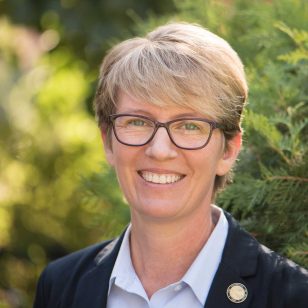The University of Idaho’s honors program director is looking to grow and expand the program into its own college.
Sandra Reineke, director of the UI’s honors program, said having an honors college would be the best option for students due to the school’s proximity to other colleges, its efforts toward recruiting students and its prominence as the premiere research school in the state.
“I would love to see this here, because frankly the institution has talked about this for many, many years and we feel now might be the right time,” Reineke said. “There are 14 peer institutions in this region — eight of those 14 have an honors college and four, including us, have an honors program.”
The goal of an honors program — and by extension an honors college — is to provide a more immersed and challenging academic experience by connecting and learning from faculty and peers, Reineke said. She also said UI’s current program stands out because there is no required GPA needed to apply out of high school.
“We look at students’ applications based on a combination of test scores, GPA and also their motivation to join the honor’s program,” Reineke said. “We don’t want to make a decision on high school grades because you find academic potential in various ways and high school GPAs often aren’t the best predictor for that.”

Cher Hendricks | Courtesy
Reineke said continuing UI students are also permitted to apply for the honors program. After admission, honors program students must maintain a 3.3 cumulative institutional GPA.
Reineke said another challenge facing the transition is the physical size of the department and its operational structure.
“Honors programs (at other universities) are oftentimes much smaller than us,” she said. “Maybe they have an honors track in their history department, and maybe they developed one in physics and so on, and they call that their honors program — it’s only a part of their institution, does not across all colleges, whereas our students come from all colleges on campus.”
While there is no definitive timeline for the potential switch, Reineke said such a transition would not be overnight, but would likely occur in phases.
“We should at least consider it strongly and see how we feel about moving forward,” Reineke said. “And, if we do, we can figure out the timeline together.”
To turn the program into a college, Reineke said university administrators would first have to seek approval for an honors college from the Idaho State Board of Education.
Cher Hendricks, UI’s vice provost for academic initiatives, said the university’s administration has been exploring the possibility with help from various academic entities such as the National Collegiate Honors Council (NCHC).
“We have a NCHC consultant that is helping us,” Hendricks said. “We’re trying to get information from the population of UI advisory boards and various other faculty on campus to see if this is a direction we ought to be moving.”
Hendricks said it is unclear how the university will decide to proceed with its honors program in the future.
“There is no plan that an honors college is what we’re going to do,” Hendricks said. “All we are doing is studying the feasibility of it.”
Becoming a college from a program requires much more than a simple title change, Hendricks noted.
“It takes a lot of resources, typically, to move to a college,” Hendricks said. “We are at a point in time where resources are more difficult to come by. The only way we could really implement an honors college soon is if we can do it without having to have an influx of new resources.”
Randall Brumfield, chief academic officer for the Idaho State Board of Education, said although average honors programs and honors colleges are separate in their functionality, UI’s honors program is not the average. Generally, an honors program is discipline specific, with a focus on particular courses, colleges or programs, Brumfield said.
“If there is not an honors college on campus, (programs) are usually housed within an academic unit, such as the college of Arts and Sciences, the college of Engineering and so on,” Brumfield said. “With that said, an honors college generally brings together students from disciplines across campus.”
Brumfield said UI’s honors program is unusual because it is independent of a specific college and succeeds in bringing together students of various disciplines.
“UI’s honors program is fifty-fifty,” Brumfield said. “On one hand, they are academic in nature because that is the purpose of the unit — to help deliver a strong academic experience for students. On the other hand, they are administrative in nature in that they are working with academic units across campus to deliver the instruction.”
Brumfield said the State Board must be notified in advance any time there is an academic program or an academic or administrative unit that is either being established, or have undergone a substantive change.

Sandra Reineke | Courtesy
While UI would need the State Board’s approval, Brumfield said much of the decision to implement the change would have to come from the university.
“It really empowers institutions to determine what is in the best interest for the student population that they serve.” Brumfield said. “If the university thought it was in its best interest for its students to have an honors college, then obviously the State Board would want to find out more about that, but at the end of the day its really going to rely on the expertise and experience of faculty and administrators to inform the board of its decision.”
Samuel Myers, a UI junior in the honors program, said the biggest improvements he imagines coming with an honors college is access to more resources, funds and opportunities for honors students enrolled in or looking to enroll in science, technology, engineering and mathematics (STEM) courses.
“I think the biggest thing the switch would do would be providing us with more funding,” Myers said. “I could see that allowing the honors program to offer a variety of more classes. The biggest impact we could potentially see in that would be honors version of upper-division courses which, especially in the STEM courses are really lacking right now.”
Myers said the biggest challenges he sees for the program becoming a college is the “speed at which bureaucracy works,” payment for additional staff and faculty and a larger physical location of the honors program.
“Turning the program into a college would probably require paying the teachers more, getting more administrative staff – paying them more,” Myers said. “They’ll definitely need more staff, they’re bleeding out of their little back office space. They’ll need more room, and whether that comes from a new building or refurbishing a building I don’t know.”
Andrew Ward can be reached at [email protected] or on Twitter @WardOfTheWords